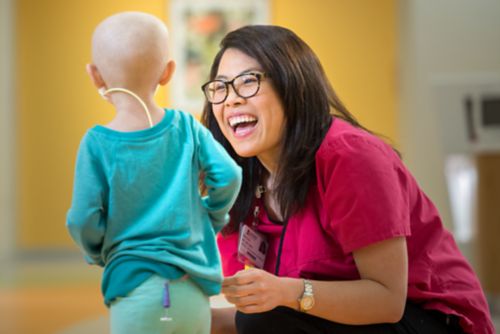Your child’s care team will include several types of nurses who serve in different roles. Some types of nurses receive more specialized training based on their specific role. This allows teams to provide complex and multifaceted services.
Understanding the roles and functions of different types of nurses may help you better understand and manage your child’s care.
Registered nurse (RN): provides a wide variety of nursing care. They monitor patients, perform assessments, give medicines, oversee daily needs, and educate patients and families about diagnosis and treatment.
Nurse practitioner (NP): advanced practice provider works closely with the physician to plan care, perform physical exams, give tests, and prescribe treatments
Licensed practical nurse (LPN): provides daily care activities and skilled nursing tasks for patients at the bedside or in clinics where treatments take place; also known as a licensed vocational nurse (LVN)
Nursing assistant: works under the supervision of an RN or LPN to provide basic daily care functions
Nurse supervisor or nurse manager: oversees nursing teams, conducts training, manages administrative tasks, and ensures quality of care for patients
Nurse case manager or care coordinator: coordinates longer-term care for patients to help manage complex medical needs
Pediatric hematology/oncology nurse: provides specialized nursing care to children and teens with cancer or blood disorders, performs assessments, gives chemotherapy and other medicines, monitors for side effects, and educates patients and families about diagnosis and treatment
Oncology clinical nurse specialist (OCNS): serves as a clinical expert and consultant for the nursing staff on complex patient issues and focuses on improving efficiency and access to care; also known as advanced practice nurses (APNs) who are certified in oncology
Pre-op nurse: provides care and prepares patients for surgery and other procedures
Nurse anesthetist (CRNA): prepares patients for anesthesia, gives anesthesia or sedation medicines during surgery or other procedures, and monitors patients during procedures
Operating room (OR) nurse: cares for patients during surgery alongside other surgical team members
Post-anesthesia care unit (PACU) nurse: works with patients after surgery as they recover from anesthesia; also known as recovery room nurse
Emergency room (ER) nurse: treats patients in a hospital emergency room (ER) and provides care for conditions due to illness, trauma, or injury
Intensive care unit (ICU) nurse: works in the intensive care unit (ICU) and provides complex care to patients with serious medical conditions. Many ICU nurses work with patients in a certain age bracket, such as children in the pediatric intensive care unit (PICU) or neonatal intensive care unit (NICU).
Home care nurse: offers home-based care to patients and may specialize in different aspects of care such as children with developmental or mobility issues




